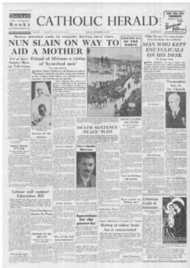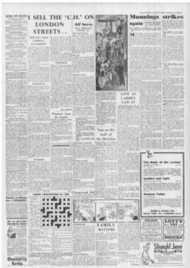Page 2, 14th November 1952
Page 2

Report an error
Noticed an error on this page?If you've noticed an error in this article please click here to report it.
Tags
Share
Related articles
Mr. Pritt Protests
Bishop Offered To Resign From B.b.c.
Cardinal Writes To Wilson
Catholics And The Press
Catholic Herald, July 27, 1956
MGR. HEENAN REPLIES TO MR. PRITT
How Red courts conduct trials
IR,--Most of the correspon
dence arising out of my articles on Spain has been addressed not
TO THP. CATHOLIC HERALD but directly to myself. I have had
letters from various parts qf England, from France, and, of course, from Spain.
In my articles I disclaimed any specialist knowledge. Mine were the impressions of a tourist. But in view of the widespread prejudice against Spain I thought it worth while to draw attention to some of
the favourable aspects of the Spanish scene. I did not, however, disguise the less pleasant features.
To my surprise all my correspondents-apart from one anonymous anti-Franco zealot-complained that I had been too harsh in my judgment of contemporary Spain. I am glad that this was the main criticism. For had I returned with nothing but praise my report would have certainly been dismissed as mere propaganda.
In the event, I believe that some Catholics at least will now be better able to realise that they may have
been victims of prejudiced reporting on all things Spanish.
To those who think that I did not give sufficient credit, I can only say that they are probably rights They will know Spain far better than I. But in four articles it is necessary to strike some sort of balance. To have stressed only what is good would, as I have said, have defeated my purpose. I agree with my critics that Spain is achieving impressive results in social reform. So with them I have no quarrel. I am left to deal only with Mr. Pritt. This should not be difficult.
Mr. Pritt is to the English Bar what the Dean of Canterbury is to the Church of England. I must presume that both are honest men. But, like the Dean, Mr. Pritt is naive in his approach to the Soviet Union and her satellites. The Dean was hurt when intelligent people laughed so heartily at his description of the children of Korea collecting American germs off chop-sticks. I am sure that Mr. Pritt is eqbally puzzled by the wry amusement he gives by claiming that justice is fairly administered in Communist States.
Since Mr. Pritt's comments are numbered 1 shall pay him the courtesy of taking his points in his own order : 1 Mr. Pritt says that he was never 1 • sent as an observer to a political trial. It just happened that he was present in Soviet States when trials took place. Naturally we accept his word. But it is not out of place to congratulate him as a journalist on the remarkable coincidence which found him in a country just when political trials were being staged. I imagine that the Soviets were immensely pleased to see him. They are not so keen to have their trials witnessed by some of Mr. Pritt's equally competent but less starry-eyed colleagues.
1 He has seen friends and relatives Z•• talking to prisoners in Soviet courts. So have I. But I saw this happen only at trials which were not I wonder if Mr. Pritt's experience was very different from my own? It is hard to credit that he does not know of the jeopardy in which relatives of political prisoners find themselves in Communist States. This, after all, is common knowledge. But if this fact has so far escaped Mr. Pritt's notice there are thousands who have lived in Russia who can inform him.
But if he is unwilling to accept the words of the victims themselves, perhaps he will look up for himself the Soviet law of confiscation of
property. He will find how tragic is the outlook of the family of a convicted political prisoner. But perhaps Mr. Pritt does not really need to look up the Soviet law. Perhaps he knows this vindictive aspect of It already. If not he is singular indeed among those who have studied Soviet criminal law.
'2 Regarding the f reedom of
prisoners to chose their own advocates, Mr. Pritt says that only one "wholly ignorant of legal procedure in Communist States" could doubt it. "From a very early stage in the history of all these countries," he writes, "the choice has not only been free, but its freedom has been made effective by machinery for paying the advocate if the prisoner cannot afford to pay; and the advocates have an honourable record for doing their best for their clients. To give one example, the Japanese germ-warfare experts tried at Khavarovsk were defended by two of the leaders of the Moscow Bar."
I think that Mr. Pritt must be relying on the fact that most of his readers will be "wholly ignorant of legal procedure" in the Soviet Union. They may safely be expected to imagine that the accused in the Soviet Union behave more or less as accused persons in this country. Comrade prisoner is pictured discussing with his friends how best to raise the money in order to retain the most talented barrister in town. If he has no money he applies for a dock brief. Readers would, further, be expected to imagine the members of the Moscow Bar considering, like our own barristers, whether or not to accept a brief.
But Soviet barristers are not in the least like English barristers. Mr. Pritt knows well that they are not. The Soviet lawyer is the servant of the Soviet State. He does what he is told. He does not choose briefs. He is giVen them. He prosecutes or defends as and when the State directs.
But, says Mr. Pritt, "the advocates have an honourable record for doing their best for their clients."
Let us see what "doing their best" has meant in political trials. What is their record?
It is that they have almost always made no pretence that their clients could be innocent. Their best has been to make the plea for their guilty clients that they were the dupes of Fascist Beasts, Wreckers, Imperialists, or Foreign Warmongers. That may be considered an honourable record by the Moscow Bar and Mr. Pritt. But not by the English Bar or by me.
With the traditions of the Common Law of England to help us, we have some idea of the meaning of justice in a trial. What happens here? The prisoner almost never pleads guilty. If he does so, the British judge is reluctant to allow him to persist in his plea. However black may be the evidence against him he is assured that he can refuse to acknowledge guilt pending proof.
Come now to the scene in a Soviet trial. With rare exceptions the political prisoner has pleaded guilty. We cannot, of course, know what has happened at most of these trials. For they were held in camera. We can only judge the phantom-like behaviour of the defendants who have been tried in public. When the limelight is turned on these unfortunates they have appeared in sackcloth and ashes. They have confessed their sins and either craved for punishment or grovelled to obtain mercy.
The English observer-except, of course, Mr. Pritt and the Dean of Canterbury-is nauseated by this spectacle.
After the prisoner has deplored his crimes the prosecutor cries out for exemplary punishment.
The most famous trials were those in which the notorious Vyshinsky was the prosecutor. This savage Soviet lawyer, who later became a dove of peace, invariably wound up his denunciations with the shout: "Shoot the mad dogs!" This demand was echoed, by order, in all, the factories and offices of the Soviet Union. To the normal English observer the scales of justice in Communist countries seem to be slightly weighted against the defendant.
The one example of the Japanese experts' trial is not, from Mr. Pritt's point of view. happily chosen. His argument would have been more powerful had he been able to quote the defence by leading Soviet barristers in the trials of such men as Zinoviev, Kamenev, Bukhari n, Rykov and Tomsky. They were, after all, all Memheis or the Politbureau. They had influence. You would think that they might have been able to hilef some of the leaders of the Moscow Bar for their defence.
Then there was Karl Radek, the leading journalist of the Soviet Union. If he had no money it might have been thought possible for Pravda to have opened a fund on his behalf. Then there was Sokolinakov, People's Commissar for Finance. You might Think that he would have known where to put his hands on a little money to retain some of the famous advocates of the Moscow Bar. But, unfortunately, he was once Soviet Ambassador in London. That would have made it very difficult for his defending counsel.
And who were the defenders of Pyatakov, People's Commisar for Heavy Industry, Serebriakov, secretary of the Central Committee of the Communist Party, Muralov, leader of the October Revolution in Moscow, Yagoda, People's Commissar
for Home Affairs, that is to say, head Mr. Pritt has put his questions, and the Bishop of Leeds has very fully answered them. The matter may end there.-Editor, CATHOLIC HERALD,
of G.P.U., Smirnov, another People's Commissar, or Yezhof. the head of the N.K.V.D. who had arrested Yagoda, his former chief?
The reason why there were no honourable advocates to make stirring defences for these political prisoners is that they had already been marked down for judicial murder.
To return to the Japanese experts. Mr. Pritt is so ingenuous in his account of Soviet justice that it is just possible that he does not know why the Japanese prisoners were accorded different treatment. Let me take it that he really does not know.
I shall tell him.
Thousands of Japanese prisonersof-war were indoctrinated with Communism while they were in the Soviet Union. Russia still hopes with their help to make Japan a satellite. It is, therefore, important not to alienate Japanese sympathy. Hence the presence of the leaders of the Moscow Bar at the trial of these Japanese.
If this Soviet manceuvre really deceived Mr. Pritt, it is not unlikely that many little Pritts in Japan were similarly deceived.
According to his lights Mr. Pritt may be sincere in defending the Soviet judicial system. I have no doubt that he was no less sincere when, during the war, he pleaded for our sympathy with the Soviet Union "attacked" by its brutal and powerful neighbour, Finland.
England is a. free country. Mr. Pritt is at liberty to support these regimes which regard priests and nuns as class-enemies to be liquidated. He will doubtless accept the Communist allegations that the main occupation of the British and American nuns in China was the murder of orphans.
It must not be thought that I consider it worth while to engage in discussion with men like Mr. Pritt and the Dean of Canterbury for their own sakes. They have seated minds. Nothing, I think, would cure them except a Soviet occupation of Britain. But what they say sometimes carries weight with simple people. That is why it is worth while to expose their fallacies.
We cannot hope to convince them. As members of that Church which is being bled to death wherever Communism is in control, we can forgive them, accept their good faith and pray for them.
John Cannel, Bishop of Leeds.
blog comments powered by Disqus







